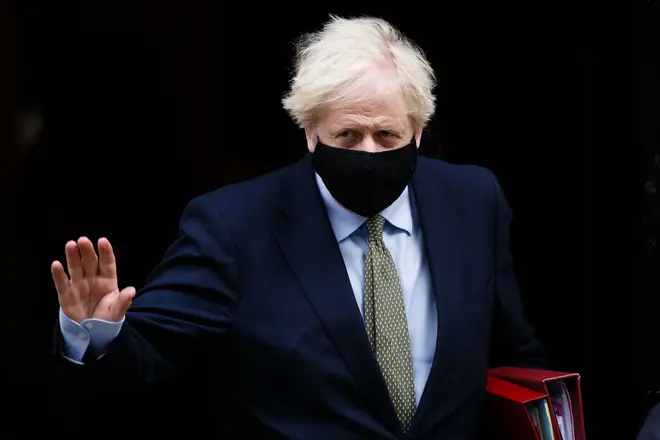
Iain Dale 10am - 1pm
14 October 2020, 22:30 | Updated: 15 October 2020, 07:46

Prime Minister Boris Johnson is resisting calls for a second nationwide lockdown as coronavirus cases continue to rise.
The prime minister told MPs on Wednesday that a so-called circuit breaker would be a "misery" and a "disaster" for the UK as he defended his regional three-tier strategy.
During PMQs, Mr Johnson conceded that he would not "rule anything out" but that he would stand firm after being advised that his Covid Alert Level approach would "bring down" coronavirus.
It comes on the day that the country reported another 19,724 cases of Covid-19 and a further 137 deaths.
The PM told the Commons: "We will do whatever it takes to fight this virus and to defeat it."
Read more: PM says circuit breaker would be a 'disaster' and defends regional strategy
Read more: UK reports another 19,724 coronavirus cases and 137 deaths

Johnson: let’s try to avoid the misery of another national lockdown
Despite accusations of "rejecting the science" from Labour leader Sir Keir Starmer, Mr Johnson held his ground and reminded his rival that any government interventions "have associated costs in terms of health and wellbeing", adding that these must also be considered against the backdrop of protecting the economy.
Nonetheless, it remains a bold strategy from the UK leader and it comes as several of Britain's European neighbours moved to introduce more stringent restrictions within their borders.
In France, President Emmanuel Macron announced the country would be in a state of public health emergency from Saturday onwards, which will see a 9pm-6am curfew introduced in several major cities, including the capital Paris.
Portugal also declared a similar state of emergency on Wednesday, while the Spanish government said it would shut down Madrid.
Elsewhere, the Netherlands imposed a four-week partial lockdown and in the Czech Republic schools have been forced to close.
Read more: France and Portugal declares state of emergency due to Covid-19
Read more: Tier 3 lockdown looms for Greater Manchester and Lancashire

Starmer: Why has the Govt abandoned the science
But the prime minister is also facing internal pressure, with regional revolts bubbling away in Manchester, Sheffield and Wales.
It was reported on Wednesday evening that the Joint Biosecurity Centre's Gold Command had signed off on new measures being implemented in Greater Manchester and Lancashire, with a final decision expected from Downing Street tomorrow.
However, Greater Manchester Mayor Andy Burnham said following the announcement: "At no point during tonight’s briefing was this news communicated to us. Media told first once again. Our position has not changed."
The mayor has continually battled against having Tier 3 measures introduced in the region and is calling for greater financial support for businesses if local lockdowns are to be introduced.
Read more: Northern Ireland to introduce Covid-19 'circuit breaker'
Read more: Wales to ban travel from UK coronavirus hotspots

Wales First Minister on imposing Covid hotspot travel ban
While in Wales, First Minister Mark Drakeford said that people travelling from parts of the UK with high rates of Covid - those in Tiers 2 and 3 - will be prevented from crossing the border.
He said his reason for introducing the measure was because he had received no communication from the prime minister.
Mr Johnson also witnessed a Tory rebellion in the Commons this week, after 42 MPs symbolically voted against his three-tier strategy on Tuesday night in protest at the 10pm curfew.
It all adds up to a war on many fronts for the so-far intransigent PM.
Nonetheless, his defiant stand against another "miserable" lockdown will be good news for businesses across the country who need the country to stay open so they can keep the economy running.

'Government has to enforce two week national lockdown'
Elsewhere, Northern Ireland has imposed a period of intensified Covid restrictions, with pubs and restaurants shut for four weeks and schools to close for two weeks over half term.
The tighter restrictions do not amount to a full-scale lockdown, similar to that imposed during the first wave of the virus, but the measures nevertheless mark a significant ramping up of the response to spiralling infection rates.
First Minister Arlene Foster said rising figures were of "grave concern".
"We fully appreciate that this will be difficult and worrying news for a lot of people," she said.
"The Executive has taken this decision because it is necessary, and we discussed the impacts in great detail. We do not take this step lightly."

Chancellor warns second lockdown would cause ‘permanent damage’
Back in Manchester, a joint letter signed by Mr Burnham and all ten of the area's council leaders agreed with the "principle of having tiers of restrictions" to simplify messaging but said the region could not accept stricter measures without any financial support.
The letter slammed the government over poor communication and its refusal to respond to suggestions for the area sent days ago.
They suggested Tier 2 restrictions with extra measures - such as banning the sale of alcohol past 10pm - to curb the virus would be preferable.
And in Scotland, First Minister Nicola Sturgeon said she supported her Welsh counterpart's call for travel restrictions on people in areas with high levels of coronavirus.
Following the announcement, she tweeted: "Fully support @fmwales on this. These are public health decisions, and nothing to do with constitutional or political debates.
"@scotgov will also take whatever action we consider necessary to control COVID."
Listen & subscribe: Global Player | Apple Podcasts | Google Podcasts | Spotify